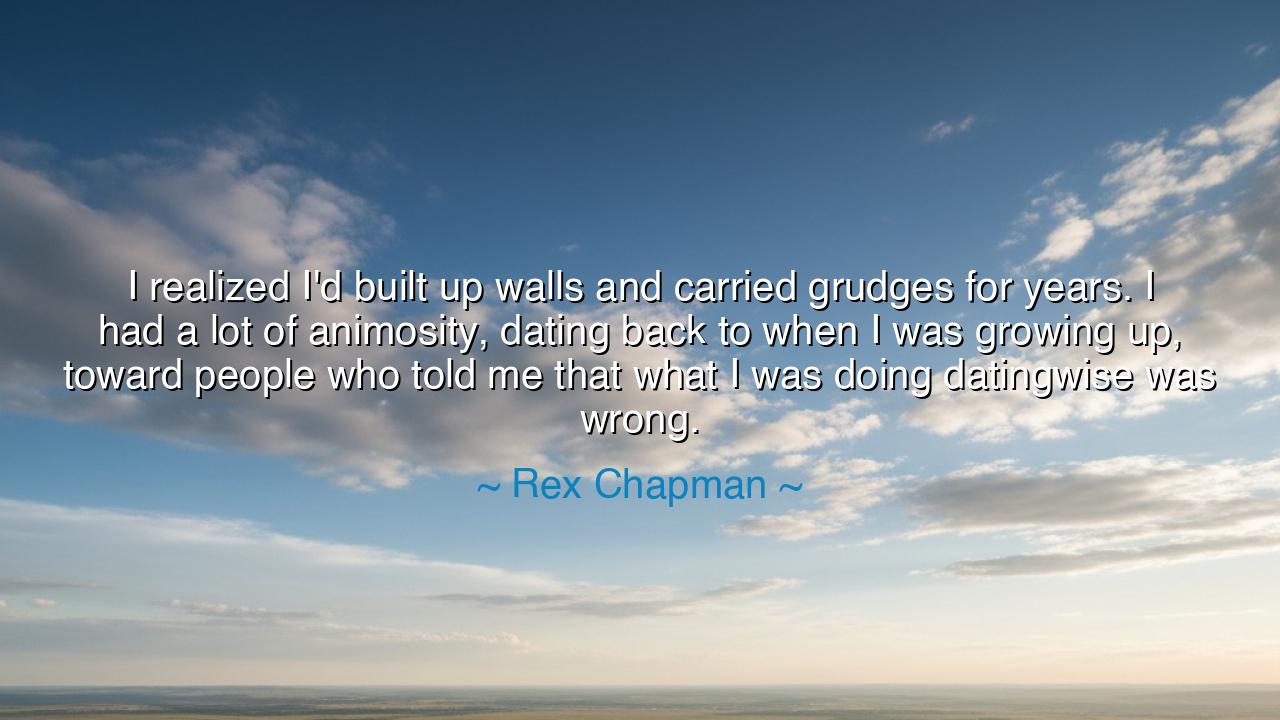
I realized I'd built up walls and carried grudges for years. I
I realized I'd built up walls and carried grudges for years. I had a lot of animosity, dating back to when I was growing up, toward people who told me that what I was doing datingwise was wrong.






The athlete and survivor Rex Chapman, known not only for his brilliance on the basketball court but for his honesty about struggle and redemption, once said: “I realized I'd built up walls and carried grudges for years. I had a lot of animosity, dating back to when I was growing up, toward people who told me that what I was doing datingwise was wrong.” These words, born from reflection and pain, hold a deep and timeless wisdom — the understanding that resentment is a cage built by the wounded heart, and that healing begins only when one dares to dismantle it. Though his confession is modern, the lesson it carries is ancient: that to forgive, both others and oneself, is to reclaim freedom.
In this quote, Chapman speaks of walls — invisible yet impenetrable — built stone by stone through the years. They are the barriers that form when the heart, once open and trusting, learns to protect itself through anger and distance. His “grudges,” carried from youth, represent a truth known since the dawn of human storytelling: that the injuries of judgment and misunderstanding, especially in one’s formative years, can harden the soul. He was judged for his choices, condemned for his expressions of affection, and told that love itself — that most sacred force — was somehow wrong. Such wounds strike not only the mind but the spirit, and unless faced, they calcify into bitterness.
The ancients spoke often of this inner imprisonment. The philosopher Epictetus taught that “it is not what happens to you, but how you react to it that matters.” Yet even the Stoics knew that reaction is not easily mastered, for the human heart remembers insult long after the world forgets it. In Rex Chapman’s realization, there is an awakening: he sees that the walls he built to protect himself also isolated him, that his animosity — though justified by experience — had become a shadow companion, shaping his life long after the original pain had passed. This moment of recognition is both humbling and heroic, for few possess the courage to look inward and confront the architecture of their own suffering.
There is an echo here of Nelson Mandela’s wisdom. After 27 years of imprisonment, Mandela said, “As I walked out the door toward the gate that would lead to my freedom, I knew that if I didn’t leave my bitterness and hatred behind, I’d still be in prison.” Both men speak of the same liberation — the release of grudges as an act of power, not weakness. To forgive those who have wounded us does not absolve their cruelty, but it removes their power to define us. The act of forgiveness, like the tearing down of walls, is not a surrender of justice but a reclamation of peace.
Chapman’s reflection also holds a mirror to our society — to the way judgment, especially about love and identity, continues to wound countless hearts. The young, in their search for belonging, often meet the cold hand of condemnation. They are told, as Chapman once was, that their way of loving or living is somehow unworthy. Yet history shows that the moral voices of one age often become the cautionary tales of the next. The prophets, poets, and artists who dared to love freely — from Sappho to Oscar Wilde — were often exiled or scorned in their time, yet celebrated later as heralds of truth. Thus, Chapman’s anger is not merely personal; it is a reflection of the injustice that arises when love itself is policed.
And yet, his realization is redemptive. In admitting that his grudges no longer serve him, Rex Chapman steps into the wisdom of the ancients — that to live well, one must let go. The walls he once built for protection became prisons; the anger he carried became weight. To drop that burden is an act of courage as great as any victory on the court. It is the turning point of every spiritual journey — when the warrior lays down his armor not because he is defeated, but because he no longer needs to fight.
So, my listener, take this teaching into your own life: examine the walls you have built, and the grudges you still carry. Ask yourself whether they shield you from harm or simply keep out the light. If you find that your heart has hardened toward those who once hurt you, remember that forgiveness is not the denial of pain, but its transformation. To forgive is to choose freedom; to let go is to make room for peace. As Rex Chapman discovered, the heart cannot soar while weighed down by resentment. Only when we dismantle our inner walls do we begin to see the horizon — wide, open, and waiting for us to step forward unbound.






AAdministratorAdministrator
Welcome, honored guests. Please leave a comment, we will respond soon